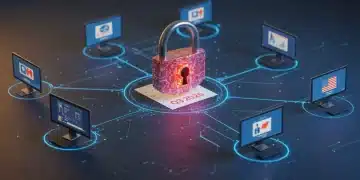Advanced fintech literacy in U.S. community colleges
Advanced fintech literacy in U.S. community colleges equips students with crucial skills for managing finances, including budgeting, saving, and investing, through practical education and real-world applications.
Advanced fintech literacy in U.S. community colleges is becoming increasingly vital for students. But what does that really mean for your education? This article dives into the role of fintech in shaping financial capabilities.
Understanding fintech: A guide for community colleges
Understanding fintech is essential for community colleges in today’s digital age. This burgeoning field combines finance and technology, offering students crucial skills for future jobs.
Many students may wonder how fintech impacts their daily lives. It involves anything from mobile banking to online payments, making financial transactions easier and more efficient.
What is Fintech?
Fintech, short for financial technology, refers to the integration of technology into offerings by financial services companies. It is changing how we pay bills, manage money, and invest. By grasping these concepts, students can become better aware of the financial tools at their disposal.
Key Components of Fintech
Understanding fintech requires knowledge of various components that play a significant role:
- Mobile Payments: Tools like digital wallets and payment apps revolutionize how we pay for goods and services.
- Investment Platforms: Automated investment services, known as robo-advisors, help manage investment portfolios.
- Blockchain Technology: This secure digital ledger is foundational for cryptocurrencies and enhances transparency.
- Online Banking: Digital banks offer services via apps, removing the need for physical branches.
These components illustrate how fintech is reshaping finance. Understanding them empowers students to navigate the modern financial landscape confidently. Additionally, community colleges can incorporate fintech into their curriculum, bridging the gap between traditional finance education and innovative technology.
By fostering financial literacy, students can better understand credit scores, budgeting, and investment strategies. Community colleges have an opportunity to lead in this domain, providing programs tailored to the demands of the fintech industry.
Empowering students with essential financial skills

Empowering students with essential financial skills is crucial in today’s economy. Many young adults lack the basic knowledge needed for personal finance management.
Community colleges have a unique opportunity to provide this knowledge through practical courses. Learning how to budget, save, and invest can set students on a path to financial success.
Core Financial Skills
Several key financial skills every student should learn include:
- Budgeting: Creating a budget helps track income and expenses, promoting better financial health.
- Saving: Understanding how to save for emergencies and future goals can help students avoid debt.
- Investing: Introductory investment knowledge, like stocks and bonds, provides students with options for growing their wealth.
- Credit Management: Learning about credit scores and how to build credit responsibly is essential for financial stability.
Teaching these skills can be interactive and engaging. Incorporating real-life scenarios allows students to practice making financial decisions. For example, role-playing can help them learn how to negotiate salaries or discuss loans.
Financial literacy programs can also encourage collaboration among students. Group projects on budgeting tools or investment strategies can enhance their learning experience. By sharing knowledge, students build a supportive community.
Ultimately, equipping students with financial skills prepares them for the future. It instills confidence and fosters independence in managing their finances both during and after college.
Curriculum development for fintech literacy
Developing a robust curriculum for fintech literacy is essential for community colleges. This curriculum should equip students with the necessary skills to thrive in a digital financial landscape.
An effective fintech literacy program integrates practical and theoretical knowledge. It covers topics such as online banking, digital payments, and investment strategies. Additionally, real-world applications can greatly enhance student understanding.
Key Elements of Fintech Curriculum
Several core elements should be included in any fintech curriculum:
- Foundational Knowledge: Start with basic finance concepts to ensure all students have a strong grounding.
- Technology Integration: Teach students how various technologies are applied within the financial sector.
- Hands-on Projects: Include projects that simulate real-world financial scenarios, allowing students to apply their knowledge practically.
- Guest Speakers: Utilize industry professionals to share insights and experiences, bridging the gap between theory and practice.
Workshops and seminars can also be beneficial. They provide interactive learning opportunities where students can engage with experts and ask questions. This fosters a dynamic learning environment that promotes critical thinking.
Collaboration among faculty is crucial for cohesive curriculum development. By working together, educators can ensure that all aspects of fintech are covered. Additionally, continuous feedback from students can help refine and improve the curriculum.
Ultimately, a well-developed fintech literacy curriculum prepares students for various career paths. By focusing on practical skills and real-world experiences, community colleges can produce graduates who are ready to navigate the complexities of modern finance.
Real-world applications of fintech in student lives

The real-world applications of fintech in student lives are vast and impactful. Understanding how fintech solutions affect daily activities can enhance students’ financial literacy.
One significant area is mobile banking. Many students use apps to manage their finances conveniently. These apps allow users to track spending, transfer money, and pay bills with just a few taps. This accessibility promotes better financial management.
Impact of Digital Payments
Digital payment solutions have revolutionized how students make transactions. With platforms like PayPal and Venmo, students can easily transfer funds to friends, pay for group activities, or settle debts.
Student Loans and Financial Planning
Fintech allows students to explore options for managing student loans. Online tools can help forecast loan payments and create personalized repayment plans. This guidance is vital for financial stability.
- Loan Calculators: Estimate monthly payments and understand interest rates.
- Budgeting Tools: Help students create financial plans tailored to their income and expenses.
- Scholarship Search Platforms: Streamline the search for financial aid opportunities.
Moreover, fintech companies increasingly partner with educational institutions. These partnerships help develop programs that teach essential financial skills. For instance, workshops on investing or savings can empower students to make informed financial decisions.
As students navigate financial responsibilities, having access to technology can simplify their lives. They can utilize budgeting apps or investment platforms to grow their savings, which is crucial during their studies.
Ultimately, understanding and utilizing fintech tools prepares students for the future. These applications make managing finances easier, fostering a sense of responsibility that will benefit them beyond college.
FAQ – Frequently Asked Questions about Fintech Literacy in Community Colleges
What is fintech literacy?
Fintech literacy refers to the understanding and use of technology in financial services, enabling individuals to manage their finances effectively.
How can community colleges help improve fintech literacy?
Community colleges can offer courses that teach essential financial skills, tools, and concepts, preparing students for the digital financial landscape.
What are some real-world applications of fintech for students?
Students use fintech for mobile banking, budgeting, digital payments, and managing student loans, making financial transactions easier and more efficient.
Why is it important for students to learn about fintech?
Understanding fintech equips students with critical skills for managing money, making informed decisions, and preparing for future financial challenges.





